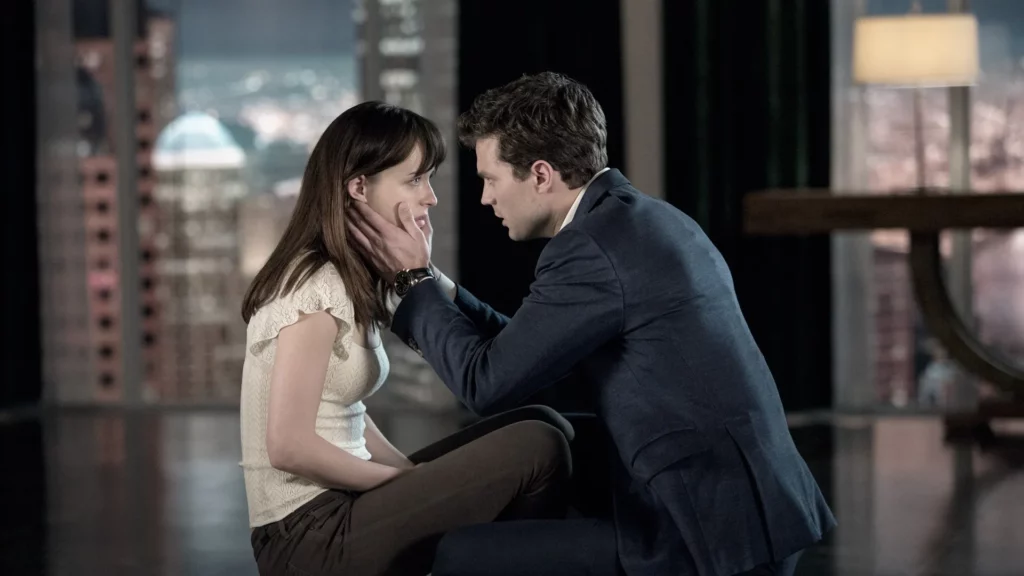
Emerging onto the scene in 2015, “Fifty Shades of Grey” swiftly became a cultural juggernaut. Its reception has been marked by a blend of fervent acclamation and pointed critique. To some, it is a trailblazing and genuinely inventive cinematic experience. In contrast, others condemn it as an overtly sexualized and intricate creation that fails to promote a constructive portrayal of gender dynamics. The mystique surrounding the reasons behind this polarizing film’s astronomical ascendancy begs exploration. Embedded within this dialogue, the impending examination shall boldly address the contentious aspects of the film and, in the final analysis, offer an angle as to why, notwithstanding the upheaval, a substantiated justification persists for viewers to engage in its observation.
Fifty Shades of Grey is not streaming in your country?
Any of our picks not streaming in your country? ExpressVPN unlocks Reelgood and all of your streaming services, giving you access to all movies and TV shows from around the world. Stream them from anywhere with a 30-day money-back trial from ExpressVPN.
- Unblock Streaming with ExpressVPN (3 months free for Reelgood users!)
- Connect to a US or UK server via ExpressVPN.
- Let ExpressVPN run in the background as you watch all of your movies and TV shows, securely and with no throttling or bandwidth limits.
Background
The film Fifty Shades of Grey is based on the same-titled book by E.L. James, which was published in 2011 and quickly rose to international fame. Following the book’s success, it was adapted into a feature film in 2015. It quickly became one of the year’s most discussed films – but not without controversy.
The Controversy
Since its inception, Fifty Shades of Grey has been a target of critique. The portrayal of a relationship deemed abusive and detrimental is at the forefront of concerns. The central figures, Anastasia Steele and Christian Grey navigate a tumultuous connection characterized by a turbulent array of physical, psychological, and emotional complexities.
Furthermore, the film has drawn criticism for its inadequate portrayal of women. Anastasia is frequently depicted in a submissive position, with Christian consistently assuming a dominant role. This could potentially convey a troubling message, where submission is erroneously linked with female empowerment—a viewpoint that some perceive as a potentially harmful narrative for young women.
Finally, Fifty Shades of Grey has also been blasted for sexualizing violence against women. Christian adopts a lifestyle rooted in BDSM (bondage, discipline, dominance, submission, sadism, and masochism), which both parties consensually embrace. Nevertheless, some perspectives might perceive this choice as possibly entailing the degradation of women.
Despite all the controversy, Fifty Shades of Grey gives audiences unique insight into understanding relationships that contain more than just love. People are exposed to a plethora of insights and realizations about relationships, especially for women, it offers a different perspective on how a woman should handle a man rather than the standard “do as you’re told” approach.
Why You Should Watch
Amid its several limitations, there remains ample motivation to experience the film. Even for those not ardently devoted to the book, the movie holds merit and warrants a viewing.
Primarily, the film presents an exceptional avenue for individuals to acquire insights into the BDSM lifestyle within a secure setting. Frequently relegated to the realms of taboo, this topic remains shrouded in limited awareness, necessitating a more comprehensive understanding.
The movie also educates people on the importance of consent. Throughout the movie, Christian and Anastasia ensure that any activity they may partake in is consensual. This encourages people to understand the importance of going through activities and acts in consensual agreements.
Finally, the movie allows audience members to enter unfamiliar worlds and experience unknown thrills. The offering allows spectators to explore uncharted territories, fostering introspection and prompting them to scrutinize and interrogate their entrenched convictions and conventional norms.
Trailer for Fifty Shades of Grey
Fifty Shades of Grey Cast
Sam Taylor-Johnson (Director): Sam Taylor-Johnson directed the film adaptation of “Fifty Shades of Grey.” Her artistic direction and creative vision played a significant role in bringing the story’s themes and characters to life on screen.
Dakota Johnson (Anastasia Steele): Dakota Johnson took on the role of Anastasia Steele, the protagonist of the story. Her portrayal captured the journey of a young woman who becomes entangled in a complex and passionate relationship with Christian Grey.
Jamie Dornan (Christian Grey): Jamie Dornan starred as the enigmatic and wealthy businessman Christian Grey. His performance captured the multifaceted personality of the character, revealing both his dominant nature and vulnerabilities.
Jennifer Ehle (Carla Wilks): Jennifer Ehle played Carla Wilks, Anastasia Steele’s mother. Her role added familial depth to the story, providing insight into Anastasia’s background and relationships.
Eloise Mumford (Kate Kavanagh): Eloise Mumford portrayed Kate Kavanagh, Anastasia Steele’s close friend and roommate. Kate’s character contributed to the support network in Anastasia’s life and provided a perspective on her experiences.
Victor Rasuk (Jose Rodriguez): Victor Rasuk took on the role of Jose Rodriguez, a friend of Anastasia’s from college. His character added an element of friendship and connection to the story.
Luke Grimes (Elliot Grey): Luke Grimes portrayed Elliot Grey, Christian Grey’s adoptive brother. Elliot’s presence contributed to the family dynamics and provided insights into Christian’s background.
Marcia Gay Harden (Dr. Grace Trevelyan-Grey): Marcia Gay Harden played Dr. Grace Trevelyan-Grey, Christian Grey’s adoptive mother. Her role added depth to the Grey family’s history and influences on Christian’s life.
Conclusion
Since its debut, “Fifty Shades of Grey” has remained a film enveloped in controversy. Amid the array of critiques it has drawn, I believe that its potential to enlighten and inspire viewers to reevaluate their outlook on relationships, consent, and BDSM is noteworthy. The film’s impact merits consideration, if solely for the unique encounter it provides.
GIPHY App Key not set. Please check settings